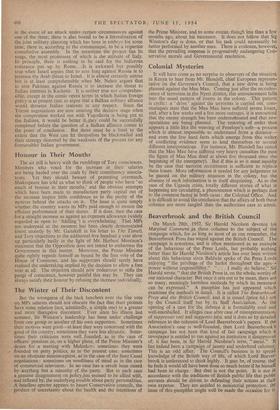The Winter of Their Discontent
But the wrongness of the back benchers over the fee vote on MPs salaries should not obscure the fact that their protests have some relation (not, admittedly, a simple one) to a greater and more disruptive discontent. Ever since his illness last summer, Sir Winston's leadership has been under challenge om one group or another of his own supporters. Sometimes heir motives were good—at least they were concerned with the good of the country; sometimes they were less altruistic. Some- times their criticisms were well founded, as in the case of officers' pensions or, on a higher plane, of the Prime Minister's desire for a meeting with Malenkov; sometimes they were founded on petty politics, as in the present case; sometimes on an obstinate misconception, as in the case of the Suez Canal negotiations : sometimes on woolliness of mind as in the case of commercial television. In no case has a revolt been raised by anything but a minority of the party. But in each case a genuine disagreement on policy has seemed to be allied with, and inflated by, the underlying trouble about party personalities. A headless spectre appears to haunt Conservative councils, the product of uncertainty about the health and the intentions of the Prime Minister, and to some extent, though less than a few months ago, about his successor. It does not follow that Sic Winston's day is done, or that his task could necessarily be better performed by another man. There is evidence, however, that the prevailing suspense is progressively endangering Con. servative morale and Governmental resolution.


































 Previous page
Previous page